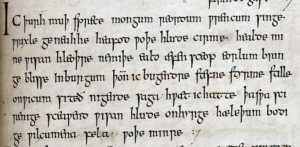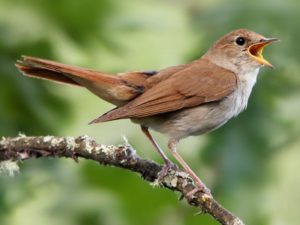Having recently translated Riddle 8 from the Exeter Book (Exeter Cathedral Library MS 3501) in my recent blog on esotericism in a sequence of Old English riddles (“Encoded References in Exeter Book Bird-Riddles“), I have decided to add my translation and recitation of this poetic enigma for our ongoing medieval poetry translation and recitation project. I accept the Old English solution nightegale “nightingale” as the poem’s solution based on parallel descriptions of the nightingale as multi-voiced (1-2) and bold of song (3-4) found in Aldhelm’s Enigma 22, which is solved acalantida (Latin for “nightingale”). However, I recognize the possibility of other song-bird solutions.

Old English Riddle 8 (solution: nihtegale):
Ic þurh muþ sprece mongum reordum,
wrencum singe, wrixle geneahhe
heafodwoþe, hlude cirme,
healde mine wisan, hleoþre ne miþe,
eald æfensceop, eorlum bringe
blisse in burgum, þonne ic bugendre
stefne styrme; stille on wicum
sittað nigende. Saga hwæt ic hatte,
þe swa scirenige sceawendwisan
hlude onhyrge, hæleþum bodige
wilcumena fela woþe minre.

“Exeter Book Nightingale-Riddle:” A Modern English Translation by Richard Fahey:
“Through my mouth, I speak with many voices, I sing in variations. Frequently, I mix head-sounds. I cry out aloud, I keep my counsel. I do not conceal my voice. The old evening-poet brings bliss to men in cities, when I storm the citizens with my voice. They sit still, listening in their homes. Say what I am called, who so clearly proclaims loudly a feasting song, announces to heroes, many welcome things with my voice.”
Richard Fahey
PhD in English
University of Notre Dame
